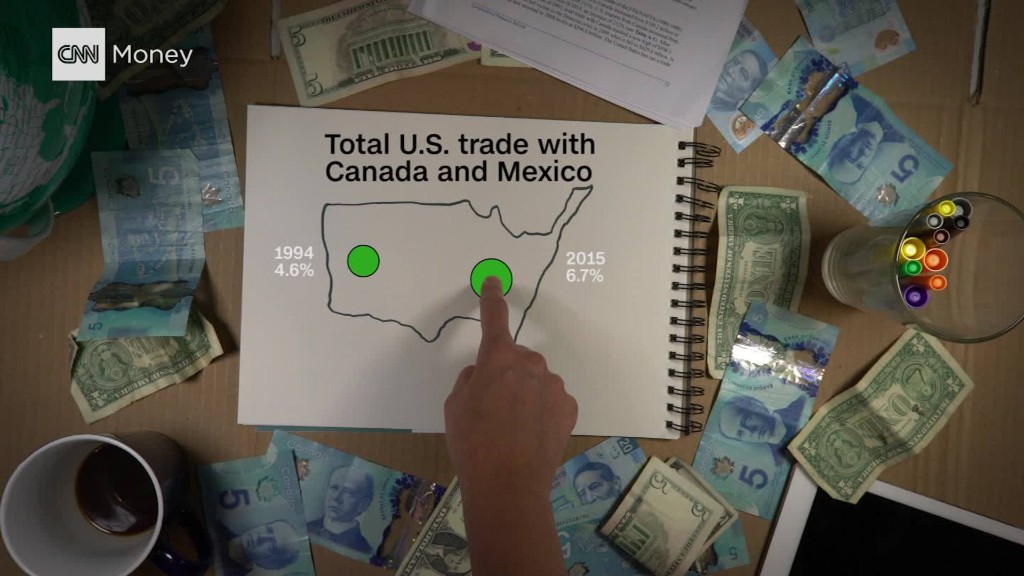
America and Canada have a significant trade relationship.
President Donald Trump had his first meeting with Canada’s Prime Minister Justin Trudeau on Monday.
“We have a very strong trade relationship with Canada,” Trump stated at the news conference.
However, the U.S.-Canada trade relationship has had its difficulties over the years. There have been trade disputes, retaliatory actions, allegations of dumping, and job losses.
“Our trading relationship is undoubtedly robust…but the relationship has been challenging, despite the agreements we have in place,” says Stuart Trew, an editor at the Canadian Centre for Policy Alternatives in Ottawa, Canada’s capital.
While Trump often criticizes Mexico and NAFTA, the trade agreement between the U.S., Mexico, and Canada, Canada is rarely mentioned.
Interestingly, there have been more NAFTA dispute claims against Canada, mostly by U.S. companies, than against Mexico. Even today, Canada has imposed high tariffs on the United States, and the two countries recently resolved a contentious meat-related disagreement.
Most leaders and experts emphasize that trade ties between the two nations are strong and generally positive. However, Canada and America have faced numerous conflicts along the way.
Now, Trump aims to renegotiate NAFTA, and this will be a key focus of his meeting with Trudeau.
1. Canada receives more NAFTA complaints than Mexico
Despite Trump’s rhetoric, it is actually Canada, not Mexico, that has faced more challenges within NAFTA. Since the agreement’s establishment in 1994, there have been 39 complaints brought against Canada, mainly by U.S. companies. Known as investor-state dispute settlements, these complaints are typically resolved by a special panel of NAFTA judges instead of local courts in Mexico, Canada, or the U.S.
In comparison, there have only been 23 complaints against Mexico. (Both Mexico and Canada have filed a total of 21 complaints against the U.S.)
Moreover, Canada has been the target of an increasing number of American complaints. According to the Canadian Centre for Policy Alternatives, since 2005, Canada has faced 70% of the NAFTA dispute claims.
2. The U.S.-Canada lumber dispute
It is not just NAFTA that has caused friction between the two countries. In 2002, the U.S. imposed a roughly 30% tariff on Canadian lumber, accusing Canada of “dumping” its wood in the U.S. market. Canada disputed this claim and argued that the tariff resulted in the loss of 30,000 jobs in its lumber industry.
Tom Velk, an economics professor at McGill University in Montreal, describes this dispute as a significant point of contention in Canadian-American relations for a long time.
The origins of this dispute can be traced back to the 1980s when American lumber companies accused their Canadian counterparts of unfair practices.
Whether Canada actually violated the rules remains a contentious issue. Canadian officials deny that the government subsidizes softwood lumber companies. However, American lumber companies claim it does, and a U.S. Commerce Department report from 2004 found that Canada had provided subsidies to lumber companies. It did not clarify whether these subsidies were ongoing.
According to the allegations, Canada’s ownership of the lands from which the wood is sourced, combined with the country’s ample lumber supply, allowed it to price its products lower than U.S. companies.
Ultimately, the World Trade Organization sided with Canada, rejecting America’s claim. In 2006, the two countries reached an agreement to end the tariff.
However, this agreement and its grace period expired in October, leading to renewed tensions. The Obama and Trudeau administrations were unable to reach a compromise before Obama left office, and the issue of lumber remains a contentious trade matter, with U.S. lumber companies once again calling for tariffs.
Related: ‘Without NAFTA’ we’d be out of business
3. Smoot-Hawley triggers U.S.-Canada trade war
The trade relationship between the two countries further deteriorated during the Great Depression. In 1930, Congress implemented the Smoot-Hawley Act to protect U.S. jobs from international trade. This act imposed tariffs on all countries that exported goods to America, aiming to shield workers.
Canada strongly objected to this policy and retaliated more than any other country against the U.S., resulting in a trade war.
According to Doug Irwin, a Dartmouth Professor and author of “Peddling Protectionism: Smoot-Hawley and the Great Depression,” “Canada was so incensed that…they raised their own tariff on certain products to match the new U.S. tariff.”
For instance, when the U.S. increased the tariff on eggs from 8 cents to 10 cents, Canada retaliated by increasing its tariff from 3 cents to 10 cents—a threefold increase.
Consequently, exports dramatically decreased. In 1929, the U.S. exported nearly 920,000 eggs to Canada, but three years later, the number decreased to about 14,000, as reported by Irwin.
Related: Remember Smoot-Hawley: America’s last major trade war
4. Canada’s high tariffs on U.S. eggs, poultry, milk
Even today, Canada maintains high tariffs on U.S. imports of eggs, chicken, and milk, despite the elimination of the Smoot-Hawley Act.
For example, Canada’s Agriculture Department reports tariffs of up to 238% per dozen eggs and as high as 292% on certain milk imports, depending on their fat content.
Tom Velk highlights that these tariffs are so burdensome that American eggs are virtually nonexistent in Quebec.
On the other hand, Canada’s Embassy in the U.S. suggests a different perspective. Canadian officials argue that despite the high tariffs, Canada remains one of the top export markets for American milk, poultry, and eggs.
While the U.S. imposes tariffs on goods from all countries, they are significantly lower than Canada’s tariffs.
Experts note that these tariffs continue to frustrate some American dairy and poultry farmers, who face challenges in selling their products in the Canadian market. However, they also believe that little is likely to change since these tariffs have been in place for decades.
Related: Those Reagan tariffs Trump loves to talk about
5. COOLer heads and the future of NAFTA
Despite these disputes, experts emphasize that the trade relationship between the two countries remains one of the strongest in the world.
In fact, the level of interconnection between the two countries is so deep that during trade disputes, some American companies align with their Canadian counterparts against U.S. lawmakers.
An example of this was the case of Canadian meat producers opposing a U.S. law that required labeling of the origin of cattle. Canadians argued that the law discriminated against their meat in the U.S. and took the case to the World Trade Organization.
The WTO ruled in favor of Canada, and in December, Congress repealed the country-of-origin labeling law. Surprisingly, American meat producers, whose businesses are closely linked to Canada, supported their Canadian counterparts, asserting that the regulation was overly burdensome.
Regarding Trump’s proposal to dismantle NAFTA, many American and Canadian experts argue that renegotiating or terminating the agreement would do more harm than good. The level of integration among the three countries makes disentangling their economies detrimental to trade and economic growth.
–Editor’s note: This story was originally published on August 11, 2016. We have since updated it.
CNNMoney (New York) First published February 13, 2017: 11:11 AM ET








